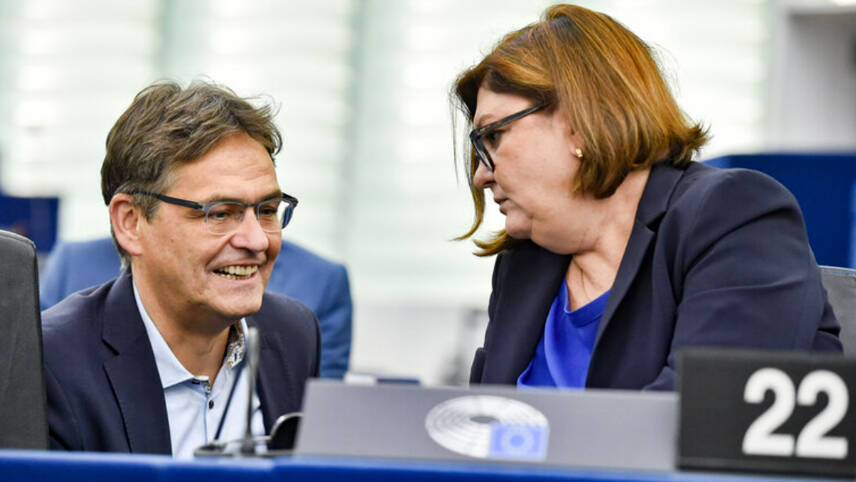Register for free and continue reading
Join our growing army of changemakers and get unlimited access to our premium content

Pictured: MEP Peter Liese (L) speaks with EU Transport Commissioner Adina Vălean. Image: © European Union 2022 - Source : EP. https://multimedia.europarl.europa.eu/en/photo/ep-plenary-session-renewable-energy-directive_20220913_EP-136131E_EVD_EG_015
The EU carbon market is responsible for 10% of the rise in electricity prices, according to Peter Liese, a German MEP who is steering the revision of the EU’s Emissions Trading Scheme (ETS) in the European Parliament.
The short-term fix will see a “frontloading” of CO2 emission allowances in order to flood the EU carbon market with liquidity, send the price of carbon down, and ease pressure on electricity prices, he explained.
“My assumption is that this intervention will keep the price well below €100 [per tonne of CO2 emitted],” the German conservative MEP told journalists at a press briefing on Tuesday (27 September).
Liese said many SMEs were struggling to survive and needed all the support they could get from the EU to lower their energy bills. And even though he sees renewables and energy efficiency as the long-term answer to the crisis, new clean energy projects will take time to build and deliver results. “That’s why we need a short-term solution,” he said.
The ETS currently puts a price on the CO2 emissions of around 10,000 industrial facilities as a way of incentivising clean technology. It is currently being revised to align with the EU’s objective of reducing emissions by 55% before 2030.
In May, the European Commission proposed drawing €20bn from the EU carbon market’s stability reserve (MSR) in order to finance a €300 billion emergency plan to move away from Russian fossil fuels.
The plan, called REPowerEU, doubled down on renewable energy investments, efficiency measures, and hydrogen deployment in order to get Europe out of Russian fossil fuels “well before 2030”.
But Liese said the proposal was too controversial with centre-left political groups in Parliament, which rejected it.
Rather than drawing allowances from the MSR, lawmakers agreed instead to “frontload” CO2 permits from the pool of allowances that EU countries can draw from in the period running until 2030.
The allowances would be auctioned from May next year until the end of 2025. Once €20 billion are raised from the auction, the mechanism would stop, Liese explained.
“It will be taken from the member state’s auctioning share,” which means EU countries will have less money from the ETS after 2026, the German MEP said. And after that, there will be less allowances left in the pool until 2030, which means pressure to decarbonise “will be even higher,” Liese said.
“That’s why member states are not so happy,” he admitted.
In addition, MEPs strengthened spending rules by inserting new criteria in the draft legislation to ensure EU member states use the money only for the green transition, in line with the EU’s green finance taxonomy.
The plan presented, by Liese on Tuesday, was endorsed by the four largest political groups in the European Parliament – the centre-right European People’s Party (EPP), the left-wing Socialists and Democrats (S&D), the centrist Renew Europe (RE) and the Greens.
“It’s important that Parliament sends a strong signal that we do not want allowances to be taken out of the MSR to finance REPowerEU,” said Mohammed Chahim, a Dutch MEP who is shadow rapporteur on the ETS reform for the left-wing S&D group.
“Financing RePowerEU should not lead to more emissions. By frontloading allowances that would otherwise be auctioned by the member states we are maintaining the climate integrity of EU ETS,” Chahim said.
The compromise deal will now be submitted to the Parliament’s environment committee on Monday before it is taken to plenary. EU member states have yet to take a formal position on the Commission’s REPowerEU proposal.
“Our message is very clear,” Liese said. “The climate agenda is not over. We want to be even more ambitious on the way to 2030. And we think this will be possible with this proposal.”
Frederic Simon, EurActiv.com
This article first appeared on EurActiv.com, an edie content partner


Perhaps I do not see the CO2 problem in the same light as many, but it seems that huge efforts are made in this field which are, in reality, not practical technical moves, but are confined to the political discussion arena.
These do not solve technical, scientifically oriented problems.
Am I mistaken? Are there more meetings of committees, conferences, targets etc., than ironmongery on the ground?
Do tell!!
Richard Phillips